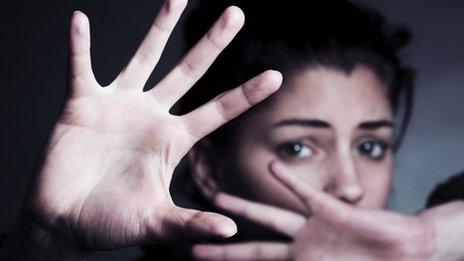Alexandra Macesanu: Romanian girl’s 'calls for help released by family'
- Published
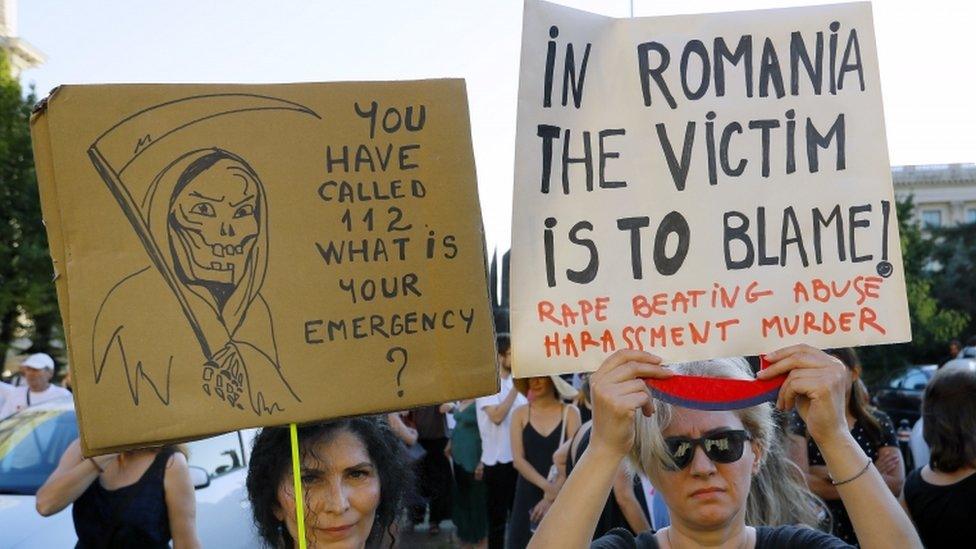
Romanian authorities have been criticised her their handling of Alexandra Macesanu's kidnapping
The family of a 15-year-old Romanian girl whose kidnapping has provoked public uproar has released transcripts purporting to be her pleas for help while she was being abducted.
Alexandra Macesanu, who disappeared last Wednesday west of the capital, Bucharest, called police three times during her kidnapping.
By the time a search was launched, 19 hours later, she was presumed dead.
Suspect Gheorghe Dinca, 65, has told police he killed Alexandra.
He also admitted killing another teenage girl, 18-year-old Luiza Melencu, who had been missing since April.
Police found bones during a search of Mr Dinca's home but are yet to confirm whether they match the DNA of either Alexandra or Luiza.
The case has caused outcry, leading to mass protests and the sacking of Romania's chief of police and other officials. The interior minister has also resigned, saying anyone guilty of delaying the police response would pay.
On Tuesday, Alexandra's uncle, Alexandru Cumpanasu, released what he said was a transcript of her calls, external.
"Please stay with me on the line, I'm really scared," she said in her final call to the emergency number 112, according to the transcript, which was posted on Facebook.

Alexandra Macesanu, 15, called police three times during her kidnapping
In response, the officer told her she "can't stay on the line" because she had other calls, assuring her a police car would come "without fail" within minutes, according to the transcript.
The authenticity of the transcript has not been independently verified by the BBC, but Romania's interior ministry has been contacted for comment.
The General Inspectorate of Romanian Police told the BBC an investigation into the emergency calls was under way.
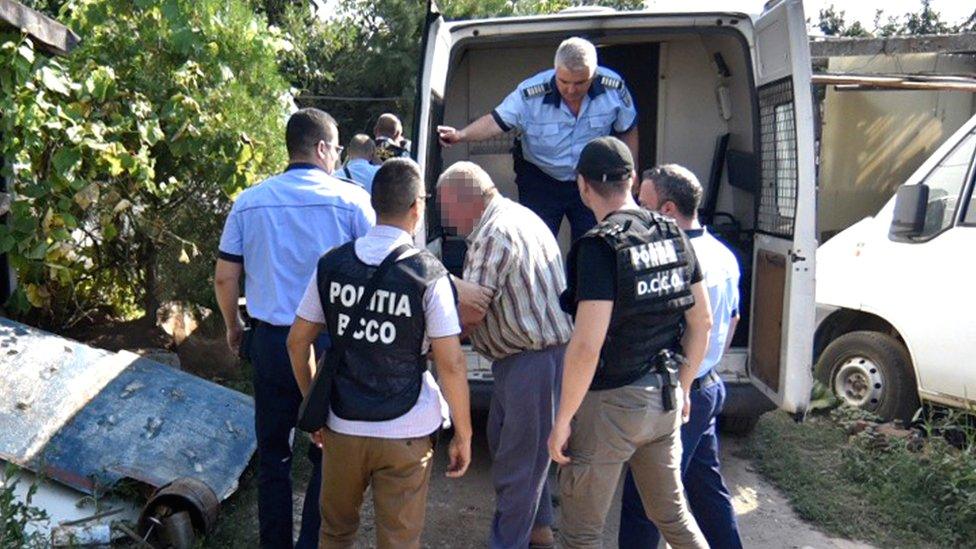
Romanian police officers escort suspect Gheorghe Dinca (C) to his home for a search
Some Romanian media have broadcast what they said were leaked fragments of the calls, according to Reuters news agency.
Alexandra's family accused officials of failing to take the calls seriously. Romania's police chief Ioan Buda has been sacked and interior minister Nicolae Moga has resigned, but critics are demanding more resignations.
On Saturday, thousands of demonstrators marched through the streets of Bucharest, chanting "incompetence" and calling for more government sackings.
Protesters chant "resign" at a rally in Romania over missing teen Alexandra Macesanu
At the weekend, police found human remains and jewellery belonging to Alexandra during a search of Mr Dinca's home.
Mr Dinca's lawyer, Alexandru Bogdan, told Romania's national news agency Agerpres on Sunday that his client had "confessed [to] his crimes".
What happened to Alexandra?
Alexandra disappeared last Wednesday while hitchhiking to her home in the southern city of Caracal, police said.
On Thursday morning, she called the emergency 112 hotline three times and said she had been abducted.
Authorities said they initially struggled to trace the location of her call and searched three buildings before identifying the house at 03:00 (00:00 GMT) on Friday.
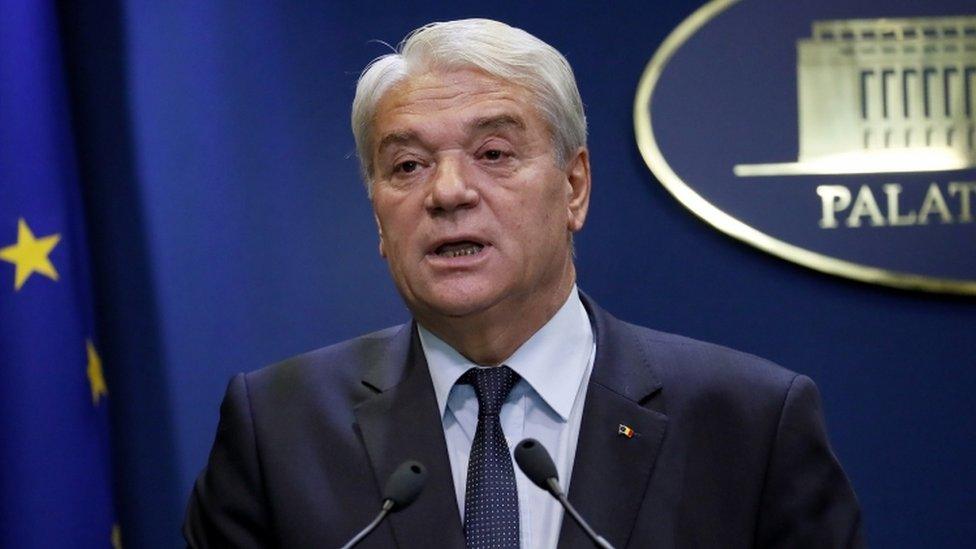
Romania's interior minister Nicolae Moga resigned over the handling of Alexandra's kidnapping
Police then applied for a search warrant - even though it was not legally required - and waited until the morning to enter the house.
They did not search the property until 19 hours after Alexandra's final emergency call.
Police said they suspected the human remains found at the property - which were sent for testing - belonged to the girls.
What do the call transcripts say?
Alexandra made the three phone calls to 112 on 25 July between 23:03 and 23:12, according to the transcript shared by her uncle, Mr Cumpanasu.
In the first call, Alexandra tells the operator she has been kidnapped by a man and taken somewhere in Caracal. Unable to find out where Alexandra is being held, the call disconnects and the operator requests help from a police officer.
Minutes later, in a second call, Alexandra tries to give the operator more details about her kidnapping.

Romanian activists hold placards at a protest over Alexandra's kidnapping
She tells the operator she is being held captive in a house, but is "locked in a room" and can "only see a gate". Midway through the second call, a police officer takes over from the operator.
Alexandra reads an address and the policeman tells her to remain where she is until officers arrive. "Please come fast I'm afraid of him, he beat me," Alexandra says, according to the transcript.
The conversation ends and Alexandra makes a third call. "Please, did you send anyone?" Alexandra asks at the beginning of the call.
"I think he's coming back and I'm afraid."
An officer, once again, assures her that police have been sent, telling her to "relax and calm down a bit", as she sobs on the phone.

A nation watching closely
By Nick Thorpe, BBC Central European reporter
This distressing case - involving two teenage girls - is gripping Romania. Each day, new details make headlines.
The results of DNA tests on charred bone and teeth fragments found in the murder suspect's house are due to be announced on Friday. Although the suspect, 65-year-old Gheorghe Dinca, has admitted murdering both girls, there are inconsistencies in his story about where he apparently disposed of the bodies.
The story is affecting national politics too.
Even Monday's surprise decision by the Constitutional Court to throw out recent changes to the criminal code - pushed through parliament by the Social Democrat-led government - has been connected to the case. Some commentators suggest that the current atmosphere in the country influenced the court's decision.
Just three months before elections, Prime Minister Viorica Dancila is struggling to limit the damage to her government.
"Romania must … mend what can be mended, and replace what can be replaced, to make [state institutions] operate as soon as possible, the way they should have operated and unfortunately failed," she said on Thursday.
Romanians remember how an earlier Social Democrat government was forced to resign in November 2015, because of a string of failures, which led to the death of 65 young people in a nightclub fire in Bucharest.
- Published29 July 2019
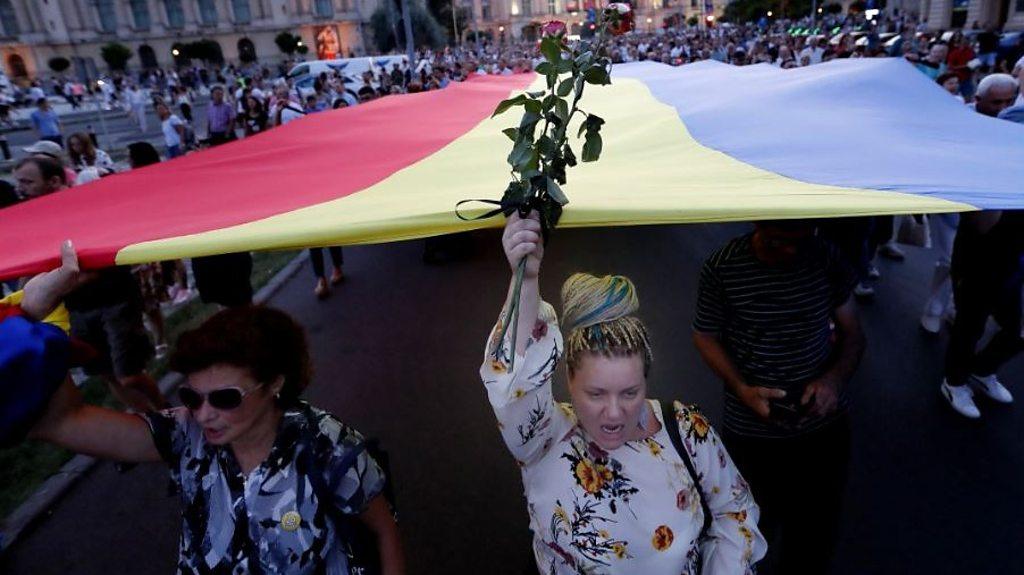
- Published29 July 2019

- Published5 March 2014
